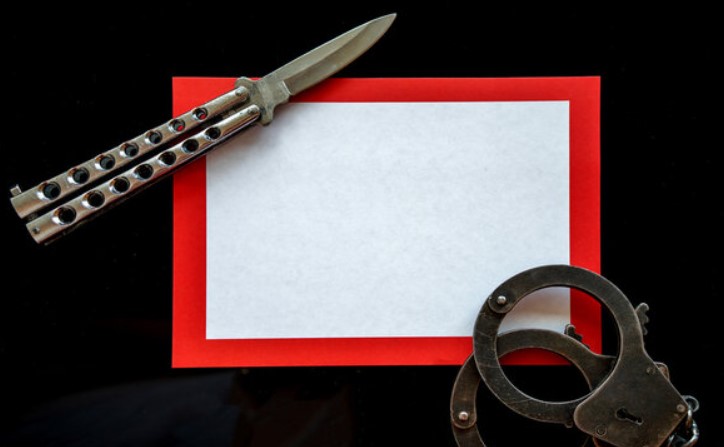Butterfly knives, also known as balisongs, are popular for their unique design and functionality. Their legality, however, varies significantly across different countries due to concerns over concealment, ease of use in criminal activities, and public safety. In Brazil, the laws surrounding knives, including butterfly knives, are governed by national legislation, with specific provisions for their possession and use.
This article provides an in-depth look into the legality of butterfly knives in Brazil, examining the relevant laws, penalties for violations, and practical advice for collectors and enthusiasts. Follow: self-defensetools.com!
1. Overview of Brazilian Weapon and Knife Laws
Brazil has relatively flexible laws regarding knives compared to firearms, but the possession and use of certain types of knives can still be restricted. Knife laws in Brazil are primarily governed by the Brazilian Penal Code and local state regulations, which aim to balance public safety with personal freedom.
Key Aspects of Brazilian Knife Laws:
- General Legality: Most knives, including folding knives and utility knives, are legal to own.
- Public Carry Restrictions: Carrying knives in public spaces is subject to local regulations and restrictions.
- Intent-Based Classification: The legality of carrying a knife often depends on the user’s intent and the context of possession.
2. Legal Status of Butterfly Knives in Brazil
The legal status of butterfly knives in Brazil is not explicitly mentioned in national legislation. However, the general principles of Brazilian knife laws can be applied to determine their legality.
Possession:
- Owning butterfly knives for private use or collection is generally legal, as Brazilian laws do not specifically prohibit the possession of such knives.
Public Carry:
- Carrying butterfly knives in public spaces can be considered illegal, especially if they are deemed to pose a threat to public safety or are associated with criminal activity.
- The determination of legality often depends on the context. For example, carrying a butterfly knife during outdoor activities like camping may be permissible, while carrying one in an urban area without a valid reason can lead to legal issues.
Trade and Importation:
- The sale and trade of butterfly knives are not specifically restricted in Brazil. However, imported butterfly knives must comply with customs regulations, which may vary depending on the item’s classification.
3. Why Are Butterfly Knives Considered Controversial?
Butterfly knives are often viewed as controversial due to their unique characteristics and historical association with violence.
A. Ease of Concealment:
- Butterfly knives can be easily hidden due to their folding mechanism, making them a preferred choice for individuals seeking concealed weapons.
B. Rapid Deployment:
- Their ability to be quickly opened with one hand increases their potential for misuse in dangerous situations.
C. Cultural Perception:
- In some regions, butterfly knives are associated with criminal activity, leading to their negative perception among law enforcement and the public.
4. Penalties for Violating Knife Laws in Brazil
The penalties for violating knife laws in Brazil depend on the nature of the offense and the intent behind carrying or using a knife.
A. Illegal Carrying of Knives:
- Individuals found carrying a knife, including a butterfly knife, in public without a valid reason may face fines, confiscation of the knife, or warnings.
B. Use in Criminal Activities:
- If a knife is used to commit a crime, it can lead to severe penalties, including imprisonment and additional charges for weapon possession.
C. Import Violations:
- Importing knives classified as weapons without proper authorization may result in confiscation and potential legal action.

5. Practical Advice for Knife Enthusiasts in Brazil
Knife enthusiasts in Brazil can enjoy their hobby responsibly by adhering to the country’s regulations and taking precautionary measures.
A. Understand Local Laws:
- Familiarize yourself with both national and state-specific laws regarding knives to avoid legal complications.
B. Limit Public Carry:
- Avoid carrying butterfly knives or other similar knives in public spaces unless you have a valid reason, such as outdoor or professional use.
C. Focus on Collection:
- Use butterfly knives for private collection purposes and keep them securely stored at home to minimize risks.
D. Seek Legal Guidance:
- If in doubt about the legality of a specific knife, consult a legal expert or local authorities for clarification.
6. Legal Alternatives for Knife Enthusiasts
For individuals seeking alternatives to butterfly knives, Brazil offers a variety of legal knife options:
A. Folding Knives:
- Standard folding knives with locking mechanisms are widely available and legal for private use.
B. Fixed-Blade Knives:
- Fixed-blade knives are suitable for outdoor activities like camping, fishing, and hunting.
C. Traditional Knives:
- Brazil is known for its high-quality traditional knives, such as gaúcho knives, which are widely accepted and used for cultural and practical purposes.
7. Comparison with Other Countries
Brazil’s approach to butterfly knives differs from the strict prohibitions found in some countries and the lenient policies in others.
Countries with Similar Stances:
- United States: Knife laws vary by state, with some states allowing butterfly knives and others imposing restrictions.
- Philippines: Butterfly knives are widely legal and culturally significant as balisongs.
Countries with Strict Prohibitions:
- United Kingdom: Butterfly knives are classified as offensive weapons and are illegal to own, carry, or trade.
- Australia: Butterfly knives are prohibited weapons nationwide.
- Germany: The possession, sale, and importation of butterfly knives are illegal.
8. Conclusion
In Brazil, butterfly knives are not explicitly banned, but their use and carrying in public are subject to scrutiny. While owning a butterfly knife for private collection is generally permitted, carrying one in public without a valid reason can lead to legal issues. Knife enthusiasts in Brazil should focus on responsible ownership, adhering to local laws and cultural norms to avoid complications.
By exploring legal alternatives and staying informed about knife regulations, collectors and users can enjoy their interest in knives while respecting public safety and legal boundaries.
Related Posts: Are Butterfly Knives Illegal in Japan? Understanding Japanese Knife Laws









